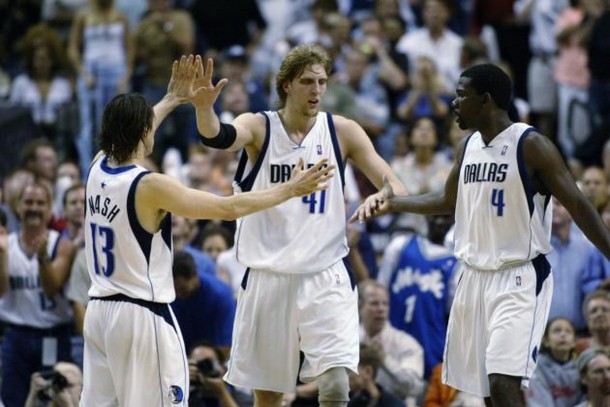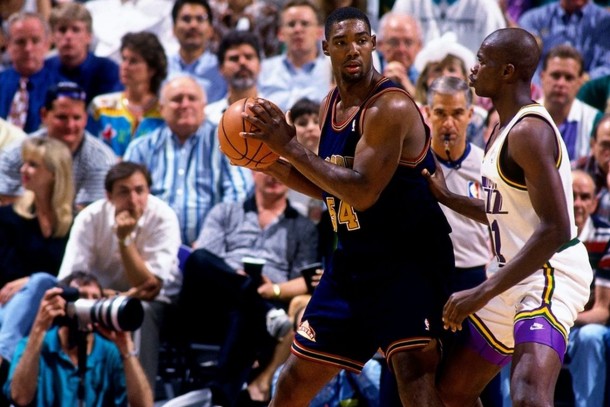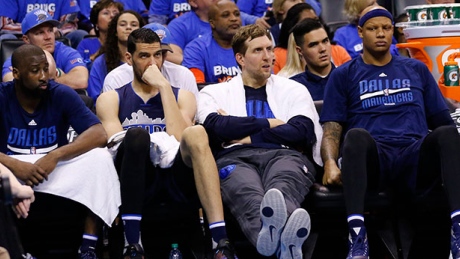The first round of the NBA playoffs is only one game old, and yet you can rest assured you’ll need to go to the broom closet at least once, probably twice, and maybe three or four times.
The blowouts in the Western Conference — not unexpected, but still a bit deflating — have reminded us that the West playoffs don’t really begin until the conference semifinals. Getting high-end second- and third-round matchups will satisfy the palate, but this week of drudgery is the tradeoff hoops fans will have to accept.
What doesn’t have to be accepted: Seeing these series go to a Game 4 when one team is up 3-0.
Yes, it’s time for the NBA not to adopt an across-the-board best-of-five format in the first round, but to declare a series over when one team goes up 3-0. The “escape-hatch rule” ought to be created.
It very probably won’t be… but it should be.
Game 1 wins by 30+
2000-2015: 3
2016: 3— Dan Feldman (@DanFeldmanNBA) April 18, 2016
You can look at the above tweet and conclude — reasonably enough — that the cry for a truncated first round (in the event of a 3-0 series) is a knee-jerk response to an unusually uncompetitive round of Game 1s over the weekend. Perhaps. Yet, the idea of a 3-0 “escape-hatch rule” is precisely meant not as an inherent restructuring of the whole first round; it’s aimed at mending one and only one kind of series: a blowout series.
Any series that’s 2-1 after three games remains best of seven. Any series that’s 2-2 won’t have a winner-take-all Game 5. It remains a best-of-three fight with a possible Game 7 conclusion.
We love Game 7s. We loved Spurs-Clippers going seven last spring, not five. It was a slugfest worthy of the extended combat. With a uniformly applied best-of-five format, basketball fans would have been cheated in a big way.
On the other hand, when 3-0 series are allowed to limp into a Game 4, this is what can happen:
When the team trailing 3-0 in a series is given the ability to compete in a Game 4, it has nothing to lose. The series exists in that unpleasant liminal space: essentially over, but not yet technically over.
Such a situation invites recklessness and a “who cares?” mentality from the trailing team. Keeping in mind that the escape-hatch rule should only apply to first-round series and not the remaining three playoff rounds, this rule is precisely meant to prevent a 7 or 8 seed from jeopardizing the 2 or 1 seed’s chances of winning the NBA title.
This is what happened with Kelly Olynyk injuring Kevin Love in the 7-versus-2 series between the Boston Celtics and the Cleveland Cavaliers. This was Game 4 of a 3-0 series, and it certainly altered the complexion of the NBA Finals.
Critics will say that if you want to win the championship, you have to win four games in each round — it’s part of the challenge, part of the endurance test. That’s a fair point — major tennis tournaments are best of five sets, and you know the event is more significant as a result. Why not apply the same principle to the NBA playoffs?
Unlike tennis, basketball is a team sport with salaried employees. Tennis’s main vehicle for earnings is the winning of a match on a given day. NBA players are the foci of much more important — and communal — investments by other people. Owners invest money. Executives invest their approval. Coaches invest their teaching skills into players. Fans invest their emotions into them. The league shouldn’t invite the possibility of more Kevin Love-Kelly Olynyk moments.

The 2003 Dallas Mavericks are the only team in NBA history to play a Game 7 in the first round after leading a series 3-0.
The NBA moved from a best-of-five first round to best-of-seven in 2003. Therefore, we’ve had 13 seasons with eight first-round series, creating a total of 104 best-of-seven first-round playoff series in league history. Of those 104 series, only one produced a Game 7 after one team went up 3-0. The 2003 Dallas Mavericks took a 3-0 lead over Portland, only to watch the Trail Blazers take Games 4 through 6 and force a Game 7, which Dallas won on its home floor.
We’ve seen multiple 3-1 comebacks in the first round — the 2003 Pistons rallied against Tracy McGrady and the Orlando Magic, and the 2006 Suns came back against the Lakers. Giving the higher seed a Game 5 home date in which to regain rhythm — thereby placing all the pressure on the lower seed to close out the series at home in Game 6 — leads to some of the richest and most compelling spectacles in sports.
We all love Game 7s, but a theater of competition which is just as compelling (and is very underrated) is the Game 6 in which the lower seed tries to finish the upset. If you remove best-of-seven from the first round, you lose that. Merely doing away with the 3-0 series should not be seen as some impossible task, or an unwelcome prospect.
Consider this, too: The NBA has not only failed to produce a 3-0 comeback in the first round; the league has never witnessed a 3-0 comeback in any round at any point in its history.

The 1994 West semifinal series between the Denver Nuggets and Utah Jazz is one of only three NBA playoff series to create a Game 7 after one team gained a 3-0 lead.
Only three times has a team even forced a Game 7 — the 2003 Blazers-Mavs series was one. The 1951 New York Knicks pushed the Rochester Royals to seven before losing in the NBA Finals. The 1994 Denver Nuggets made the climb to a Game 7 before losing to the Utah Jazz in the Western Conference semifinals.
It only makes sense that at an elite level of competition, when the lower playoff seeds are cleared away and the NBA Finals become a more realistic prospect for all teams involved, four wins should be required to advance in the NBA playoffs. We should all want to see the Spurs have to win four against the Thunder, not three (or vice-versa). The same goes for Clippers-Warriors. No one is debating the need to keep the conference semifinals and finals in a best-of-seven framework.
The first round, as we can see, is a different animal. The Dallas Mavericks and Portland Trail Blazers are overachievers, yes, but they’re not title contenders. Do we really want to see a Game 4 if either side goes down 3-0? Similarly, do we want to see the Houston Rockets or Memphis Grizzlies have to endure a fourth bloodbath against the Warriors or Spurs, when three will have already been mor than enough for the human eye to process?
Enough of the nightmare fuel, NBA.
Adopt the escape-hatch rule for 3-0 first-round series.
It’s time.


